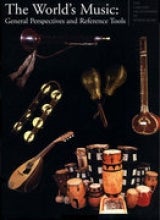Reference and Research: Ask an Archivist

This is one of an occasional series detailing what it is that archivists (and librarians) actually do. Today I will be discussing what is likely to be called Reference and Instructional Services or Reference and Research Services.
Can't figure out how to begin your research? Are you looking for unique archival resources for a paper, thesis or dissertation? Did a faculty member send you on a research-based scavenger hunt? Do you just want to listen to some music? Ask a librarian or an archivist.
Garland Encyclopedia of World Music Online
A former colleague at UCLA's Music Library, Steve Fry, used to say, "Librarians don't know everything, we just know how to find everything." Part of any professional librarian's education includes information retrieval systems, organization of knowledge, and information seeking behavior. There are even published guidelines for reference and information services providers. Simply put, we are good at finding "stuff." (We're also good at organizing "stuff," but that's a different column.)
We can assist both students and faculty with a wide range of services; orientations for specific classes, identifying on-site, electronic, and external collection resources, navigating and interpreting licensed resources and online catalogs, research consultations and referrals, course support, and more.
I know that sounds pretty dry, but it's really all about helping you find "stuff." And for me, reference is one of the more "fun" aspects of my job. I have always loved to do research (my subject specialty is history), especially archival research. For me, it's like reading a good mystery novel and solving the puzzle. As I said in another column, everything has a story and the stories interest me. Although, I should perhaps add that I have the luxury of being an academic librarian in a highly specialized "special collection."
So, what does this have to do with you, you ask? Part of my job is to help you find information... everything from a freshman listening assignment to doctoral research in a specific area. You just need to ask.
Where to start? I would highly recommend checking out my Ethnomusicology Research Guide. I have tried to cover nearly every contingency for you.
Want to find articles about your topic? Look here. As I often remind students, the catalog in any library or archive is going to help you find recordings, books, journals, manuscripts and more, but it will not help you find articles. You need to use a periodical index to find articles.
Interested in archives and special collections that specialize in "world music," look here. (And make sure you note the pull-down menu, which broadly categorizes archives and special collections by geographic area. That is, interested in the Americas? Look here.)
Looking for "world music" recording labels? I've got you covered.
Did a faculty member suggest you join a professional organization? Here's a list.
Are you a new student and unsure how to best evaluate what you are reading or unsure on how to best cite resources? Ask the faculty, of course, but this should give you a good start with some basic guidelines.
Want to listen to music online? This is one of our most commonly asked questions. I have a wealth of links to audiovisual online. Note, there is also a pull-down menu from the main tab, should you be interested in a specific geographic area, say, Africa.
What do librarians and archivists do? We have a running joke in the Ethnomusicology Archive that much of what we do is "other duties as required" (I had to order cotton swabs today to clean tape heads; yes, it's a glamorous job), but a large part of what we do is reference and research, like creating the Ethnomusicology Research Guide for you, students, faculty and researchers.
Have a question about finding music scores and sheet music or popular music resources at UCLA? Ask the Music Librarian.
Have a question about ethnomusicology or unique archival audiovisual resources, especially those in the UCLA Ethnomusicology Archive? Ask one of the archivists.
“Ethnomusicology could never have grown into an independent science if the gramophone had not been invented. Only then was it possible to record the musical expressions of foreign peoples objectively...” – Jaap Kunst in Ethnomusicology: a study of its nature, its problems, methods, and representative personalities to which is added a bibliography (1959).





